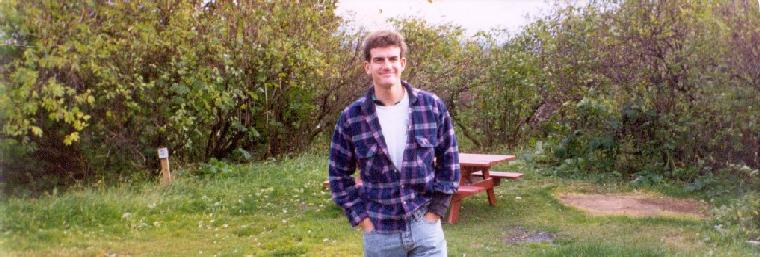
To hear that I had made a significant difference in Jos's life meant much to me. He certainly made a big difference in my own. Although my passion (and some would say life's work), my political involvement and the electoral campaigns in particular have taken a toll on me, my family and my friends. Your expressions helped me remember that there are far more positive benefits that come out of these efforts, that make them truly worthwhile -- regardless of the costs involved.
After your call, I couldn't help but spend the next several days remembering back to 1994 and my time with Jos. After receiving your email, I perused Jos's memorial web site, amazed at the paths he had taken. I laughed until I cried reading his account of our campaign stop before the Americans for the Constitution group. As I'm sure he recounted to you, Alaskan politics are like none other. The size of Alaska makes running a statewide campaign to reach a half million people scattered like seeds in tall grass -- an enormous undertaking.
I had spent years studying economics and political science, trying to find a key to unlock our stagnated political system. Over the years I had heard Alaskans say that many of our industries were owned by Outsiders. As I began to more closely follow the money in our congressional races, the answers to my questions about why we were so stuck became painfully obvious. Our powerful congressional delegation received most of their campaign money from big money interests somewhere else. That big money had more influence in determining the outcome of our elections than Alaskans did.
With a willing attorney, we began to carefully strategize how we might stir the pot here in Alaska. At the time, conventional political advisors said campaign finance reform was certain death for candidates, the issues too complex for voters. I counted on the fact that many Alaskans are constitutionally minded.
In the spring of 1994 I filed a Federal class action suit against the Federal Election Commission, our Congressman Don Young, the Democratic contender Tony Smith, and their respective campaign committees, challenging the constitutionality of out-of-state campaign contributions in congressional races (Whitmore et al. v. FEC, et al.). I alleged that they had violated our constitutional rights to equal protection and political association within what is supposed to be our representative democracy.
Having been trained in public speaking and debate, I was able to communicate and stay on this message during the campaign. The media cooperated, giving us regular statewide television, newspaper and radio coverage with each step of the way. Eventually, even National Public Radio covered the suit, catching Alaska's two gubernatorial candidates in Washington, D.C. at fundraisers, and putting them on the spot about what they thought of it all.
Almost overnight, my campaign as a third party congressional candidate took off, as the message made sense to residents here. Don and Tony, like many politicians, literally had their hands tied, reluctant to say much of anything about their specific positions, and the contrast in our statements and styles became ever more noticeable -- to the delight of the public. By that summer, we had developed a network of supporters around Alaska, and had a small statewide coordinating office in Anchorage.
I had begun my campaign the previous year based in Homer, where I live and work, and had a small office here. As the public response grew, we began preparing for statewide travel, and I geared up to move to Anchorage for the duration of the effort. It was about that time that I began getting phone messages from Jos, persistently trying to reach me about volunteering.